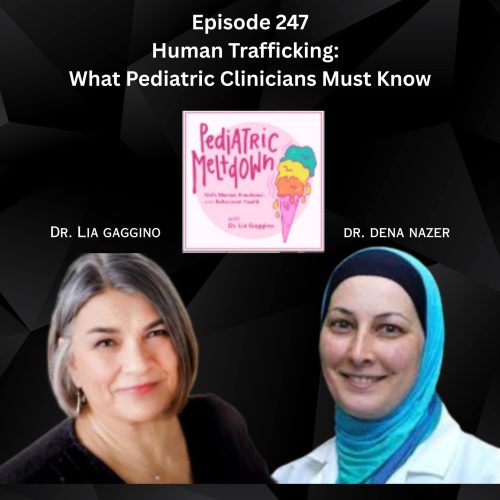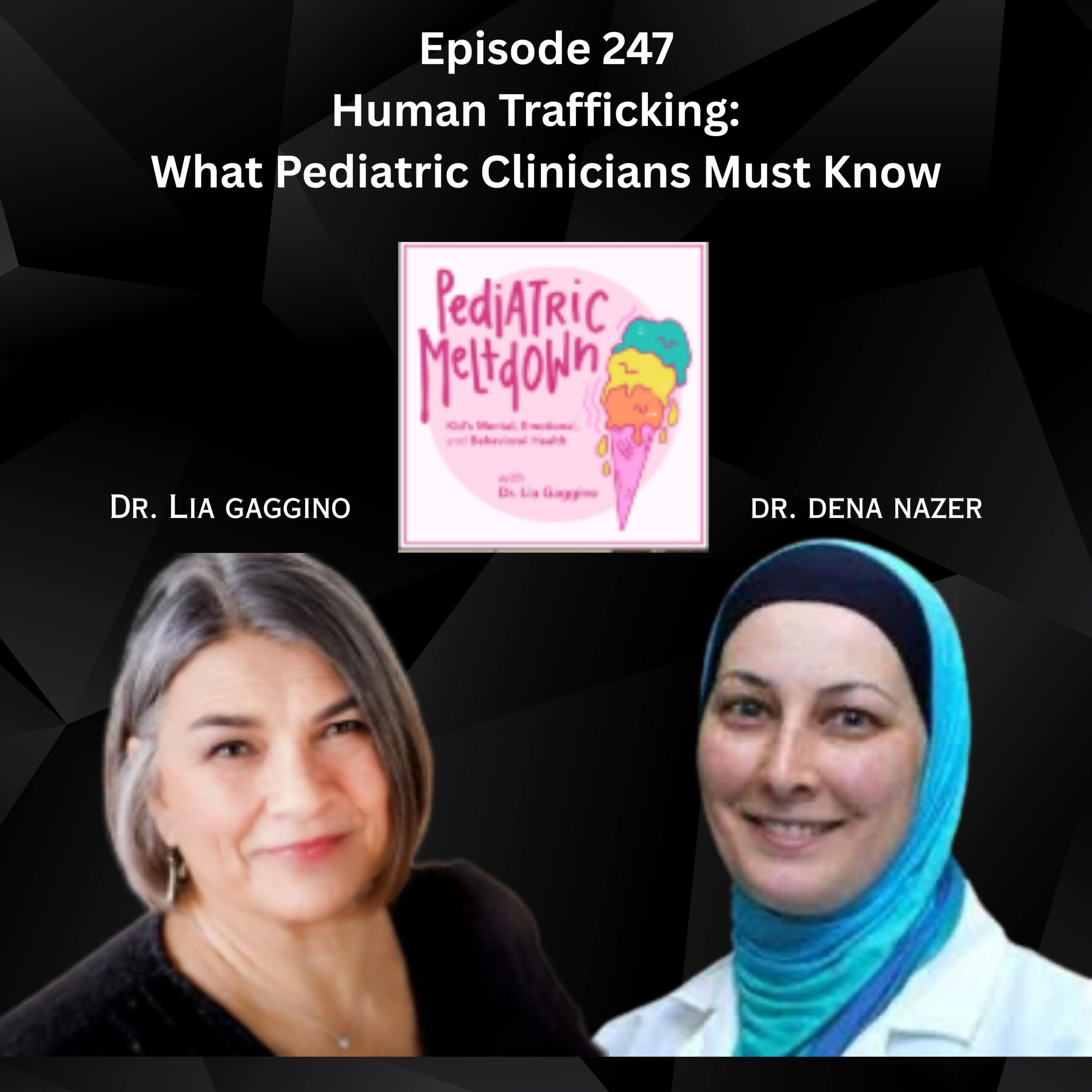Welcome to Pediatric Meltdown, the podcast for busy pediatricians who want to better understand children’s emotional health and behaviors and gain the skills and knowledge to help them thrive. I am your host, Lia Gaggino. In this episode, we are joined by Katherine Steingass, MD.
Dr. Steingass is a Developmental-Behavioral Pediatrician at Nationwide Children’s Hospital and an assistant professor of Pediatrics at the Ohio State University College of Medicine. She is a member of the complex health care team and the medical director for the Spinal Bifida Program, as well as the Program Director for the Developmental-Behavioral Pediatrics Fellowship; her primary clinical interests include evaluation and care of children with developmental delays and disabilities, including cerebral palsy, myelomeningocele genetic conditions, autism and the sequelae of prematurity.
She is a co-chair for the early childhood Special interest group in the Society for Developmental-Behavioral Pediatrics and is involved in the AAPS Council on Children with Disabilities. Dr. Steingass received her medical degree from the Medical College of Ohio at Toledo and completed her Residency at Nationwide Children’s Hospital, followed by a Fellowship in Developmental-Behavioral Pediatrics at Rainbow Babies and Children’s Hospital in Cleveland, Ohio.
Join us today as we talk about Children with Disabilities: Don’t Forget Their Emotional Well-being!
Key Highlights:
[00:01 – 22:13] Kids with Disabilities Often Miss Out on Mental Health Screening
- There is a significant body of literature suggesting that children with disabilities experience higher rates of mental health symptoms, including ADHD, anxiety, and depression.
- Developmental screening is essential for identifying kids who may be at risk for these conditions.
- Qualitative questioning can provide valuable information about a child’s overall well-being
- It is essential to balance the need to assess a child’s medical conditions with the need to determine their behavioral health.
- Should we be rethinking our perspective on medications for kids with autism?
- Behavioral interventions should be tailored to the child’s individual needs with autism.
- Physical symptoms and medical causes should be investigated to determine the cause of aggression in children with autism.
- Constipation is a common culprit in the development of aggressive behaviors in children with autism.
- There are identifiable triggers for a head banging, and it can be helpful to look at the behavior in terms of its function.
- It is vital to consider the child’s symptoms and history and their environment.
- It is common for children with autism to have comorbid mental health disorders.
- Medication options for aggression can vary depending on the child’s symptoms.
[22:14 – 37:41] We Have to be Mindful of the Families, the Parents, and Siblings When Approaching Care for Kids with Chronic Medical Conditions
- There is a lot of investigative work that needs to be done before starting a medication like this, as it has potential side effects.
- One way to help families during this difficult time is to normalize the experience and ask open-ended questions about their well-being.
- When talking with families of kids with chronic medical conditions, it is crucial to also focus on their function and quality of life.
- Developmental-Behavioral Pediatrics: Tips for Clinicians
- The importance of adapting to the environment to promote mental health for children with disabilities.
- The role of a Developmental-Behavioral pediatrician in this process emphasizes the importance of detective work to identify and address underlying issues.
- Clinicians should ask parents and children about their goals and plans for the future and their current experiences and feelings.
[37:41 – 41:24] Final Takeaways
- Kids with complex medical and intellectual disabilities may have comorbid mental health and behavioral health concerns, just like any other kid.
- Screening for mental health concerns like ADHD, anxiety, and depression might get skipped because the assumptions of these concerns pertain.
- When screening, Think: Qualitative versus Quantitative.
- Be careful about diagnostic overshadowing
- Be a detective.
- Consider frustration and communication barriers as drivers of behavior.
- When thinking about managing behaviors, once you’ve sorted out, the drivers consider adaptations and accommodations; medications might be something else to consider but keep other options open.
- Think about functional behavioral analysis. Don’t forget about the needs of the families.
- For kids with complex medical disorders, it’s okay to ask them about their hopes and dreams and to get creative so they can get to those dreams.
- Check out the canchild website and the F words tools.
- Again, be a detective! Be aware of ableism get creative with adaptations and, workarounds when you need them.
Connect with Dr. Katherine Steingass through nationwidechildrens.org
Key quotes:
“Try to figure out the why and if there are physical causes. Doing a re-review of systems and, ideally, a physical exam at the best that we can do. Trying to make sure we’re not missing something physical. And then you are thinking, okay, this is more behavioral. What can be helpful is something called functional behavioral analysis. So that is a way of looking at it. The behavior, antecedents, and consequences determine what function this serves for the child.”
– Dr. Katherine Steingass
THANK YOU FOR YOUR SUPPORT!
Pediatric Meltdown was listed as a Top 20 Pediatric Podcast on FeedSpot.
If you’d like to connect with me, you can find me on LinkedIn, Facebook, Instagram, and Twitter, or email me at gagginol@medicalbhs.com or gagginol@yahoo.com. To learn more about me visit https://www.medicalbhs.com/
LOVE WHAT YOU HEARD? Leave us a 5-star review
so we can continue to provide you with great content. Share this episode and help people
know more about children’s health and well-being.








